
#NowWatching “Man of Steel”
Considering a Twitter Thread where I tick everybody off by neither loving nor hating it enough.
Considering a Twitter Thread where I tick everybody off by neither loving nor hating it enough.
I have never really loved “Man of Steel”, even though I admire a lot of what it’s attempting.
I’d describe it as Snyder’s weakest film, but really I don’t want to get into the “Suckerpunch” discourse.
I’d describe it as Snyder’s weakest film, but really I don’t want to get into the “Suckerpunch” discourse.
“We may only have a matter of weeks.”
The Krypton sequence is “Man of Steel” in a microcosm.
There’s a lot of really, really great stuff here. But there’s far too much happening in far too little space.
It could almost be a movie unto itself.
The Krypton sequence is “Man of Steel” in a microcosm.
There’s a lot of really, really great stuff here. But there’s far too much happening in far too little space.
It could almost be a movie unto itself.
Like, Krypton is exploding. Then there’s a coup. Then there’s a reverse coup. Then there’s a trial. Then the planet explodes.
And this is all in a prologue featuring Superman’s dad, with an insane amount of worldbuilding. It’s madness.
And this is all in a prologue featuring Superman’s dad, with an insane amount of worldbuilding. It’s madness.
The obvious counterpoint to this is that Richard Donner did exactly this with “Superman”, and that’s intentional. That’s something we’ll come back to.
But Donner’s Krypton was minimalist and restrained. Zack Snyder does my do minimalism. He does “more is more.”
It’s a lot.
But Donner’s Krypton was minimalist and restrained. Zack Snyder does my do minimalism. He does “more is more.”
It’s a lot.
And yet there’s a lot of really great stuff here.
“Man of Steel” sees Krypton as the old world. It’s Europe. It’s home to decaying empire, corrupted bloodlines, ascendant fascism.
It’s what our hero has to leave to come to America.
“Man of Steel” sees Krypton as the old world. It’s Europe. It’s home to decaying empire, corrupted bloodlines, ascendant fascism.
It’s what our hero has to leave to come to America.
By the way, it’s notable that Zod is explicitly a fascist. He’s not a nihilist. He’s not a generic military man. He’s obsessed with bloodlines and purity.
Again, a science-fiction sheen on how Europe looked to America in the 1930s, when Superman was created.
Again, a science-fiction sheen on how Europe looked to America in the 1930s, when Superman was created.
With Zod, you see a clear line between the idea of monarchy and fascism, the logical extension of the fixation on the purity of certain blood lines and the idea of racial stock.
It’s somewhat bracing in the years since, as Marvel pushed the Red Skull *away* from Nazism.
It’s somewhat bracing in the years since, as Marvel pushed the Red Skull *away* from Nazism.
“You wouldn't dirty your hands but you'll damn us to a black hole for eternity!”
One of the most interesting aspects of “Man of Steel” is that for all that fans complained about its radical reworking of the canon, it’s very straightforwardly an adaptation of “Superman II.”
One of the most interesting aspects of “Man of Steel” is that for all that fans complained about its radical reworking of the canon, it’s very straightforwardly an adaptation of “Superman II.”
After all, Zod is a character who really only broke into the A-list of Superman’s rogues’ gallery as a result of “Superman II.”
Before that, he was one of a set of generic Kryptonian criminals from the Phantom Zone. So having Zod alone makes it a “Superman II” homage.
Before that, he was one of a set of generic Kryptonian criminals from the Phantom Zone. So having Zod alone makes it a “Superman II” homage.
But you see it in a lot of other choices in “Man of Steel” as well.
For example, the infamous “Superman bullied that trucker” scene is a direct reference to the scene from the beloved “Superman II” where Superman... bullied that trucker.

For example, the infamous “Superman bullied that trucker” scene is a direct reference to the scene from the beloved “Superman II” where Superman... bullied that trucker.
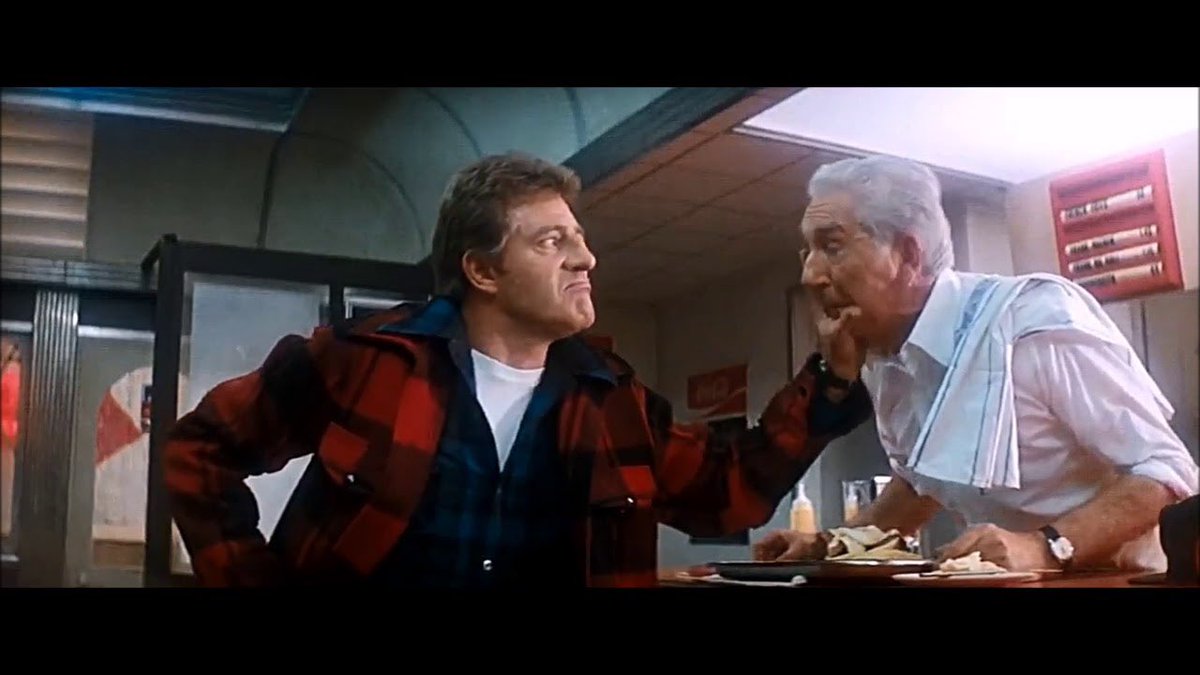

For all the controversy around the big climactic “Battle of Metropolis” in “Man of Steel”, it’s an obvious nod to the showdown at the climax of “Superman II”, which was the first time audiences saw urban destruction on that level in a superhero film.
Like a natural disaster.

Like a natural disaster.


This is one of the boldest and most interesting aspects of ”Man of Steel.”
A lot of what certain comic book fans hate about “Man of Steel” is exactly what they loved about “Superman II”, and never register the cognitive dissonance at play.
A lot of what certain comic book fans hate about “Man of Steel” is exactly what they loved about “Superman II”, and never register the cognitive dissonance at play.
To pick an obvious examples, fans called “Man of Steel” the murder verse because Superman snaps Zod’s neck at the climax.
Despite seemingly having no problem with Superman throwing Zod to his death in “Superman II.”
Despite seemingly having no problem with Superman throwing Zod to his death in “Superman II.”
More than that, “Man of Steel” confronts its audience with their hypocrisy.
Fans act as if sending Kryptonians to the Phantom Zone, without form or mass, for all eternity, without possibility of parole is somehow a moral high ground.
Instead of, you know, terrifying.
Fans act as if sending Kryptonians to the Phantom Zone, without form or mass, for all eternity, without possibility of parole is somehow a moral high ground.
Instead of, you know, terrifying.
Zod actually calls out the Kryptonian high council on this hypocrisy, pointing out that what they’re doing is probably worse than killing him, but allows them to call themselves civilised by comparison.
It’s a pretty valid point, and deliberately made.
It’s a pretty valid point, and deliberately made.
And that’s a lot of what “Man of Steel” is, and later “Batman vs. Superman.”
It’s effectively, “Here’s your nostalgic power fantasy, but enacted in a world where objects and people have mass and are made of meat.”
So you have to think about what it means that you want this.
It’s effectively, “Here’s your nostalgic power fantasy, but enacted in a world where objects and people have mass and are made of meat.”
So you have to think about what it means that you want this.
And, let’s be clear about this, this is a post-9/11 movie. It was released during the War on Terror.
So there’s something very pointed in “here’s the power fantasy that you are used to processing in sanitised form through the barrier of fantasy, but rendered monstrous.”
So there’s something very pointed in “here’s the power fantasy that you are used to processing in sanitised form through the barrier of fantasy, but rendered monstrous.”
“I asked you to tell me who first settled in Kansas?”
Similarly, the portrayal of Jonathan Kent in “Man of Steel” is controversial among fans, but here I defer to the ever insightful El Sandifer.
eruditorumpress.com/blog/man-of-st…

Similarly, the portrayal of Jonathan Kent in “Man of Steel” is controversial among fans, but here I defer to the ever insightful El Sandifer.
eruditorumpress.com/blog/man-of-st…


When Superman was created in 1938, Kansas was a bastion of progressivism.
It was founded on the rejection of slavery. It had banned the Ku Klux Klan only a few years beforehand. It ran a fricking Communist in the 1940 election.
escapistmagazine.com/v2/superman-lo…
It was founded on the rejection of slavery. It had banned the Ku Klux Klan only a few years beforehand. It ran a fricking Communist in the 1940 election.
escapistmagazine.com/v2/superman-lo…
Superman coming from Kansas in 1938 explains a lot about the values that Ma and Pa Kent instilled in Clark, and which he took with him to the big city.
Superman coming from Kansas in 1938 fits with the character busting slumlords or exposing the Klan.
Superman coming from Kansas in 1938 fits with the character busting slumlords or exposing the Klan.
Superman coming from Kansas in 2013 means something *very* different, and “Man of Steel” deserves credit for acknowledging that in its characterisation of Jonathan Kent.
The odds are high that Jonathan Kent voted for Trump in 2016, as uncomfortable as that makes us all.
The odds are high that Jonathan Kent voted for Trump in 2016, as uncomfortable as that makes us all.
Again, it’s a great idea, somewhat muddied in an execution that tries to do a little bit too much.
Jonathan Kent’s death sequence, while delightfully ironic, doesn’t really work as the drama that the film needs it to.
Even if it fits Clark’s arc.
Jonathan Kent’s death sequence, while delightfully ironic, doesn’t really work as the drama that the film needs it to.
Even if it fits Clark’s arc.
“I’m from the Daily Planet and I’d like to talk to you about your son.”
Incidentally, “Man of Steel” does something interesting with Lois by having her proactive figure out who Superman is, avoiding the usual “secret identity” nonsense and proving her a competent investigator.
Incidentally, “Man of Steel” does something interesting with Lois by having her proactive figure out who Superman is, avoiding the usual “secret identity” nonsense and proving her a competent investigator.
Incidentally, it’s a nice touch that Amy Adam’s is a full nine years older than her male co-star, particularly in an industry where women are often much younger than their male co-stars.
Kate Bosworth was only twenty-two years old in “Superman Returns.”
Kate Bosworth was only twenty-two years old in “Superman Returns.”

“He will look like you. It he is not one of you.”
Again, “Man of Steel” feels weirdly prescient, placing a strong emphasis on Superman as an alien - an illegal immigrant.
The talking head scenes of people discussing turning him over to Zod, deporting him to Krypton aged well.
Again, “Man of Steel” feels weirdly prescient, placing a strong emphasis on Superman as an alien - an illegal immigrant.
The talking head scenes of people discussing turning him over to Zod, deporting him to Krypton aged well.
Superman has obviously always been an immigrant story, but it was originally optimistic. “Give me your poor, your tired, your huddled masses...”
However, again, in the era of the War on Terror, the immigrant experience is very different. “Man of Steel” understands that.
However, again, in the era of the War on Terror, the immigrant experience is very different. “Man of Steel” understands that.
I’d argue this is something “Batman vs. Superman” does much better; Clark watching the news with Spanish-speaking immigrants, visiting marginalised and ignored communities in Gotham.
It’s a nice, timely, humanist approach to Superman.
It’s a nice, timely, humanist approach to Superman.
In this context, it’s worth noting, as @RICHARDLNEWBY pointed out, that Snyder’s “Justice League” makes a point to replicate the majestic soaring scene from “Man of Steel”, but with Cyborg.
Establishing Cyborg as the successor to Superman, underscoring this theme.
Establishing Cyborg as the successor to Superman, underscoring this theme.
It’s also incidentally, a great argument for an actual minority actor to play Superman.
In much the same way that Steven Moffat signalled it was time for a female Doctor by creating several analogous female characters of equivalent narrative stature in “Doctor Who.”
In much the same way that Steven Moffat signalled it was time for a female Doctor by creating several analogous female characters of equivalent narrative stature in “Doctor Who.”
“For what purpose?”
“So that Krypton can live again…on earth.”
My pet theory for why fans get *so angry* about “Man of Steel” is that the movie is an explicit and calculated rejection of nostalgia.
It rejects Zod’s plans to restore a glorious empire on Earth.
“So that Krypton can live again…on earth.”
My pet theory for why fans get *so angry* about “Man of Steel” is that the movie is an explicit and calculated rejection of nostalgia.
It rejects Zod’s plans to restore a glorious empire on Earth.
“Man of Steel” was the first live action Superman film since “Superman Returns.”
“Superman Returns” is one of the worst superhero movies ever made, a walk mausoleum to the memory of Richard Donner “Superman” movies.
“Superman Returns” is one of the worst superhero movies ever made, a walk mausoleum to the memory of Richard Donner “Superman” movies.
I live in constant fear of a fan “reappraisal” of “Superman Returns”, although hopefully the involvement of Bryan Singer and Kevin Spacey prevents that.
It’s essentially a gigantic fan service pack aimed at people with fond memories of the classic “Superman” movies.
It’s essentially a gigantic fan service pack aimed at people with fond memories of the classic “Superman” movies.
It’s the kind of movie that tickles the nostalgia receptors of fans who think the most important thing about Superman is how he wears his underwear.
And don’t mind that he’s a date-rapist deadbeat dad stalker who does things like possessively chide Lois for smoking.
And don’t mind that he’s a date-rapist deadbeat dad stalker who does things like possessively chide Lois for smoking.
So “Man of Steel” understands that it needs to essentially brutally dismantle this nostalgic Reagan-era fantasy if it’s going to modernise Superman in any meaningful way.
And I admire how the movie doesn’t really hold back in tearing through the Richard Donner movies.
And I admire how the movie doesn’t really hold back in tearing through the Richard Donner movies.
Incidentally, not that it will matter to people upset by the above tweets, I (much) prefer both of Donner’s “Superman” movies to “Man of Steel.”
But I also don’t like being served twenty-odd-year-old reheats. And I think it’s a problem if that’s all that’s on the menu.
But I also don’t like being served twenty-odd-year-old reheats. And I think it’s a problem if that’s all that’s on the menu.
“If Krypton lives again, what happens to earth?”
“A foundation has to be built on something.”
As a sucker for themes and mirroring, I like that “Man of Steel” and “Wonder Woman” are essentially the same narrative.
An immigrant from the old world, coming to discover the new.
“A foundation has to be built on something.”
As a sucker for themes and mirroring, I like that “Man of Steel” and “Wonder Woman” are essentially the same narrative.
An immigrant from the old world, coming to discover the new.
It’s very revealing that both “Man of Steel” and “Wonder Woman” feature scenes in which the villain shows up and promises to destroy the world to recreate a nostalgic paradise on the graves of their enemies.
It’s... almost as if that’s a theme.
It’s... almost as if that’s a theme.
Here’s the thing. The rejection of nostalgia is important in the context of these classic characters, but also in a wider cultural and political sense.
I mean, imagine there was a threat to democracy rooted in nostalgia and racism. We’d want our superheroes to fight that, right?
I mean, imagine there was a threat to democracy rooted in nostalgia and racism. We’d want our superheroes to fight that, right?
“We have a plan.”
And here we hit my big issues with the third act of “Man of Steel”, and they’re the same as with the prologue.
The climax of “Man of Steel” is just too noisy and jumbled and chaotic. It’s urban devastation is too abstract and too much at a remove.
And here we hit my big issues with the third act of “Man of Steel”, and they’re the same as with the prologue.
The climax of “Man of Steel” is just too noisy and jumbled and chaotic. It’s urban devastation is too abstract and too much at a remove.
The problem with the impersonal destruction of Metropolis at the end of “Man of Steel” is just an escalation of the issues with the constant scaling up of urban devastation in superhero films in the prior decade.
“Man of Steel” feels more horrific, but not horrific enough.
“Man of Steel” feels more horrific, but not horrific enough.
You can sense the intention here: “You’ve spent a decade eating popcorn and cheering on this repackaged and reimagined urban carnage, so here it is - right in your face.” It wants to rub the audience’s nose in this.
But “Man of Steel” doesn’t quite get it to work.
But “Man of Steel” doesn’t quite get it to work.
Incidentally, if you want a really hot take, “Batman vs. Superman” actually manages to pull off what “Man of Steel” attempts.
If you want a *super* hot take, the opening sequence of “Batman vs. Superman” is one of the superhero scenes of the decade.
If you want a *super* hot take, the opening sequence of “Batman vs. Superman” is one of the superhero scenes of the decade.
I have a theory for why “Man of Steel” doesn’t really cohere. Zack Snyder is trying too hard to make a Christopher Nolan movie.
The Daily Planet staff are like the cops, attorneys and politicians in the “Dark Knight” trilogy, supposed to put a human face on Metropolis.


The Daily Planet staff are like the cops, attorneys and politicians in the “Dark Knight” trilogy, supposed to put a human face on Metropolis.



Snyder doesn’t work like Nolan does. His characters are even more archetypal and functional than Nolan’s, less “realistic.”
His worlds feel less grounded than Nolan’s and more stylised. The climax of “Man of Steel” feels like it’s trying to be too Nolan-esque.
His worlds feel less grounded than Nolan’s and more stylised. The climax of “Man of Steel” feels like it’s trying to be too Nolan-esque.
Emily VanDerWerff makes a very sharp observation about Snyder’s visual style: he doesn’t like medium shots.
Snyder tends toward intense close-ups and wide shots. The opening scene of “Batman vs. Superman” uses this cinematic language more effectively.
vox.com/2016/3/30/1132…
Snyder tends toward intense close-ups and wide shots. The opening scene of “Batman vs. Superman” uses this cinematic language more effectively.
vox.com/2016/3/30/1132…
“A good death is its own reward.”
Also, “Man of Steel” is a prime example of a weird cinematic trend that I call “the reverse 9/11.”
Obviously, superhero cinema is hugely influenced by 9/11, but the trend goes further, towards weird heroic recreations.
Also, “Man of Steel” is a prime example of a weird cinematic trend that I call “the reverse 9/11.”
Obviously, superhero cinema is hugely influenced by 9/11, but the trend goes further, towards weird heroic recreations.
It’s nothing new to point out that American blockbuster cinema is full of lies in the sky above New York City and fallen bodies from ruined towers.
I mean, these images are from “Avengers: Infinity War.” American cinema is still working through stuff.



I mean, these images are from “Avengers: Infinity War.” American cinema is still working through stuff.
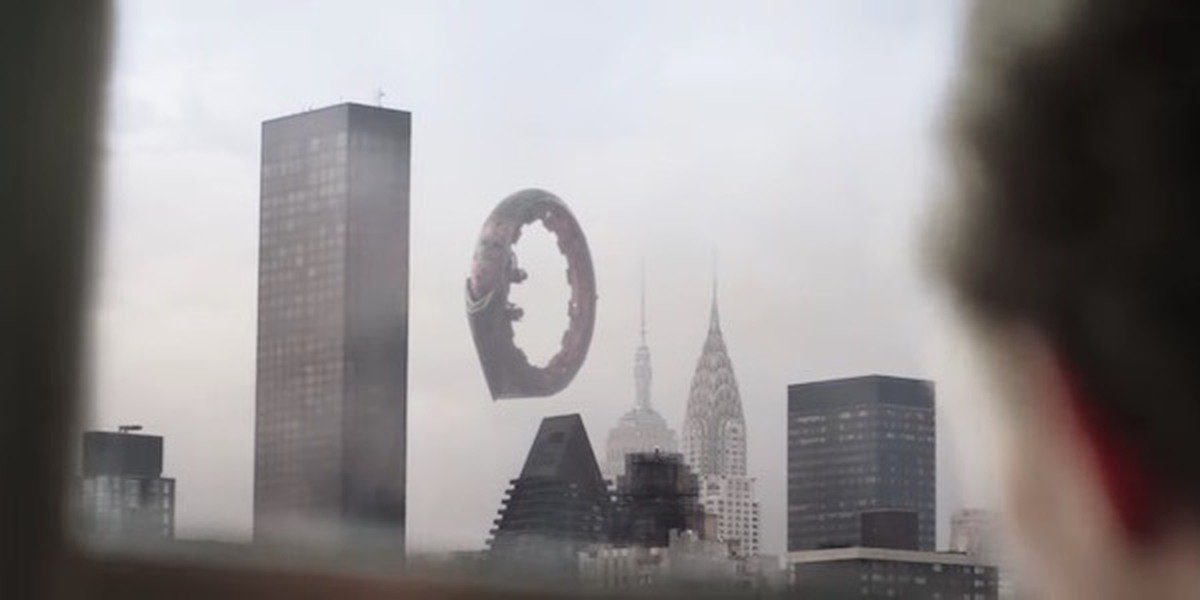
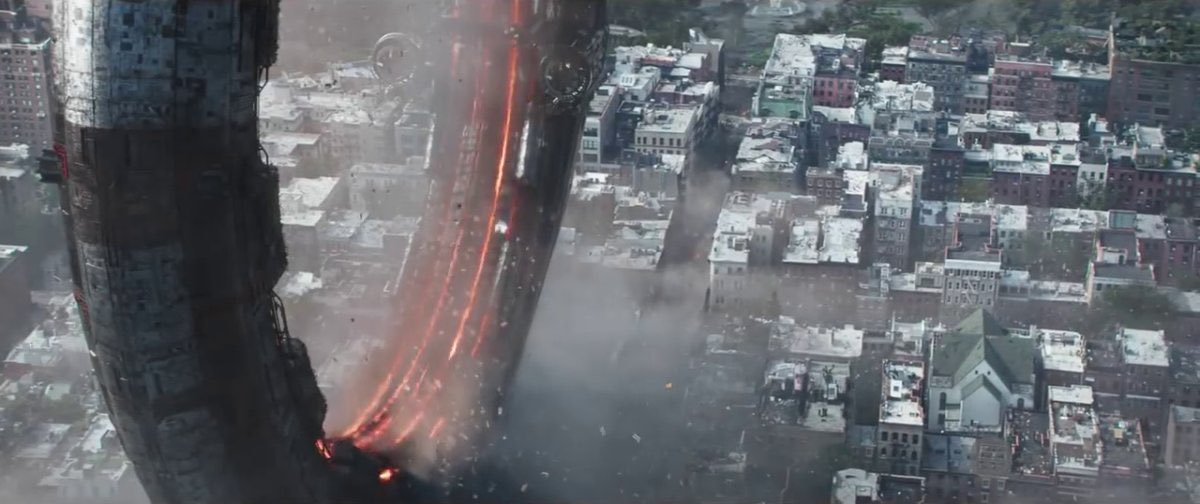
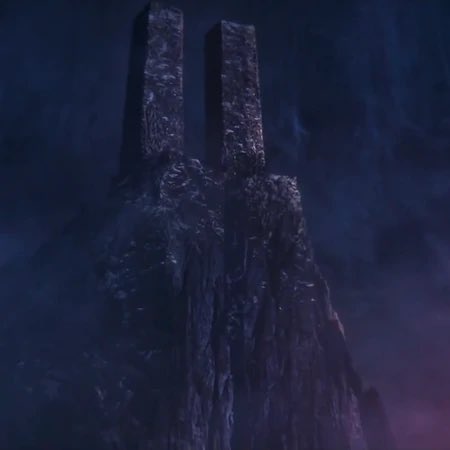
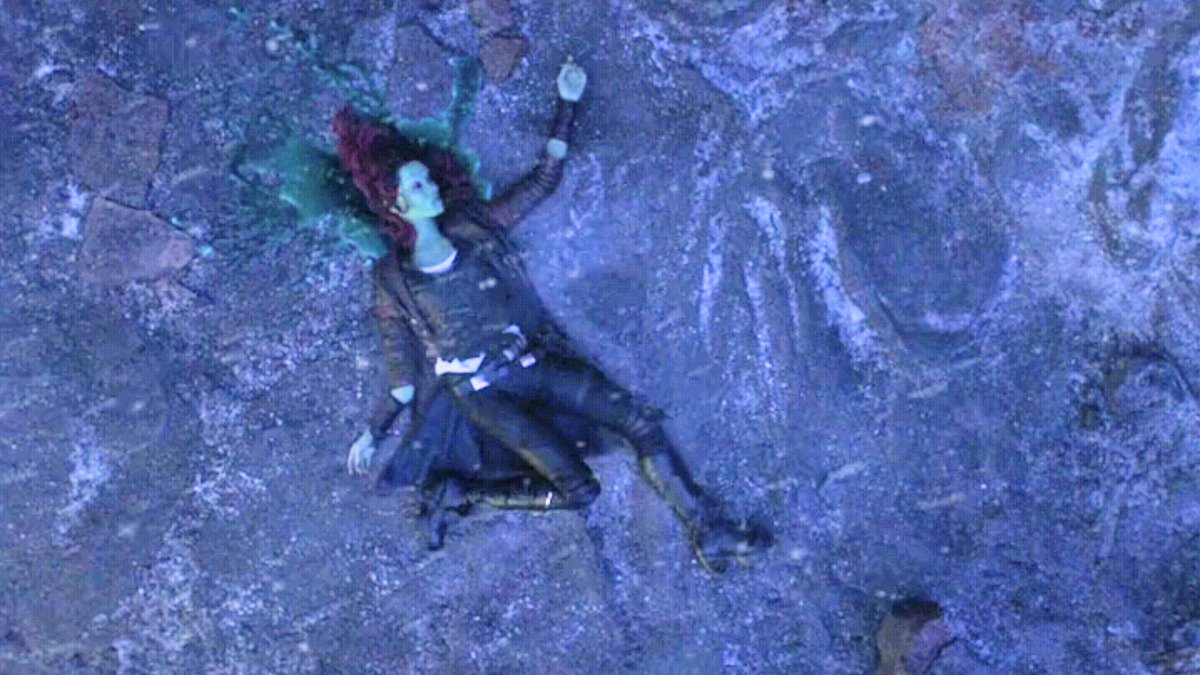
However, as with Vietnam, there’s a very strange effort to reclaim the trauma. To retell familiar riffs on these set-ups, with the Americans cast in the role originally played by the enemy.
It’s fascinating to see, and weirdly intense in terms of filtering these images.
It’s fascinating to see, and weirdly intense in terms of filtering these images.
Think of how many blockbusters after Vietnam feature our all-American heroes cast as plucky guerrilla fighters in the face of a technologically superior foe.
“Rambo: First Blood”, “Star Wars”, “Predator”, “Red Dawn”, even arguably “Die Hard” all riff on this idea.
“Rambo: First Blood”, “Star Wars”, “Predator”, “Red Dawn”, even arguably “Die Hard” all riff on this idea.
After 9/11, you see a lot more examples of suicidal air manoeuvring, as with Tony Stark in “The Avengers”, and more examples of blowing up skyscrapers for the greater good, as with “The Defenders.”
“Man of Steel” is just a *particularly* egregious example of this trend.
“Man of Steel” is just a *particularly* egregious example of this trend.

You have Hardy, a military officer, essentially flying a jet on a suicide run in a major metropolitan area, while repeating a quasi-religious-sounding mantra to himself.
I get that it’s supposed to be deeply uncomfortable, but it feels like it crosses some sort of line.
I get that it’s supposed to be deeply uncomfortable, but it feels like it crosses some sort of line.
Anyway, thus concludes my dreaded rewatch of “Man of Steel.”
It’s still a mess of a film, too cluttered at either end for its own good. But one with a wealth of great ideas, timely themes, and a distinctive vision.
Still probably my least favourite Snyder film.
It’s still a mess of a film, too cluttered at either end for its own good. But one with a wealth of great ideas, timely themes, and a distinctive vision.
Still probably my least favourite Snyder film.
Heh, I just realised that Zod from “Man of Steel” is literally a Krypto-Fascist.
• • •
Missing some Tweet in this thread? You can try to
force a refresh







